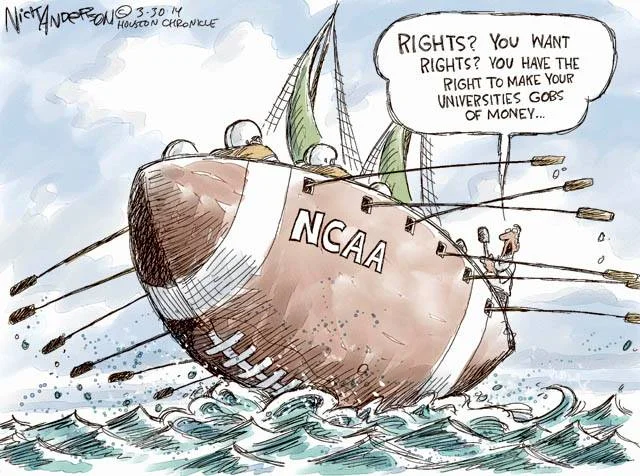2018 Sports Law Hot Topics To Watch
I PREDICT...
that 2018 should be one heck of a year in sports law!
Per usual, I would like to make my predictions regarding what topics I believe will be extra sizzlin' in 2018, but I will do so in a slightly different way. Here are brief descriptions of what each topic is, some insight as to why I have it on my predictions list, and who you can pay attention to for the latest news, updates, and analysis throughout the upcoming year:
1. Sports Betting
What It Is: In a nutshell, the Professional and Amateur Sports Protection Act passed in 1992 to make sports betting illegal nationwide, save for a handful of grandfathered exceptions that had long been established prior to the law. Christie v. NCAA, informally known and reported on as the "New Jersey Sports Betting Case," is in the Supreme Court of the United States' hands now after oral arguments took place in December. Five sports leagues - the NCAA, the NFL, the NHL, the MLB, and the NBA - sued New Jersey under PASPA to enjoin a passed law that would allow sports gambling. The State defends itself by arguing that PASPA is unconstitutional under the anti-commandeering doctrine. The major issue this case analyzes is whether a federal statute that prohibits modification/repeal of state-law prohibitions on private conduct impermissibly commandeers the states' regulatory power. I know that sounds like a mouthful, and the arguments get pretty deep, but it all comes down to whether the federal government should be allowed to forbid state-sanctioned sports betting.
Why It Will Be HOT: One massive question is sweeping across the nation as the Supreme Court of the United States sits with a lawsuit & various facts presented in its hands: Should sports betting be legal? It is more likely than not that some changes to the law's current approach to sports betting will take place. What we are waiting to see are whether those changes will have a narrow or broad affect. If SCOTUS decides to have a narrow ruling, it may only affect New Jersey as it is the specific party to the lawsuit. On the other hand, if SCOTUS takes a broad ruling approach in ruling PASPA unconstitutional, other states may grab the reigns and give permitting and regulating sports betting a shot should voters approve it.
Who To Follow: Legal Sports Report (Follow @LegalSportsReport) and its main creator Dustin Gouker (Follow @DustinGouker), Dan Wallach (Follow @WALLACHLEGAL), and David Payne Purdum (Follow @DavidPurdum).
2. Athlete Safety
What It Is: It is no surprise that injury can accompany the physicality that participating in sports demands whether it is a contact or non-contact sport. Athletes are stronger than ever before, and the awareness surrounding the resulting injuries from stronger than ever contact is higher than ever before, too. Truths about Chronic Traumatic Encephalopathy (CTE), the progressive degenerative brain disease resulting from repetitive brain trauma overtime, are scary, but we are trying to understand how prevalent it can be at different life stages so we can reform sports. There is a lot of demand to reform sports to be safer, but there is also a lot of demand to keep the products on the field, court, etc. as-is. Finding that delicate balance is proving more challenging than we may have initially anticipated.
Why It Will Be HOT: The NFL is no longer alone in its fight against former players who are bringing lawsuits against the professional league they used to play. Moreover, although the highlight of athlete safety is concerning concussion/brain injury awareness, education, and prevention, the issue extends to other areas of the body as well as the overall mental well-being of athletes that, in turn, could produce physical effects. We are seeing concussion protocols fail on live television. We are seeing near-record lows of young kids entering into football programs. We are seeing high schools test out the latest technology like helmets that can help us better understand and prevent head injury. We are seeing major motion pictures, special sports news segments on shows like Dateline and Outside the Lines, opinion articles in local newspapers, and increased criticisms across social media platforms regarding serious athlete injuries. We even saw what could be the first diagnosis of CTE in a live human being. As a society, we are starting to demand more from our athletic and medical communities when it comes to athlete safety. With all the crazy stuff going on in the world right now, we are learning to voice our displeasure and do what is necessary to keep sports thriving so we can continue to enjoy participating in, cheering for, and patroning them.
Who To Follow: Paul D. Anderson (Follow @PaulD_Anderson), Sheilla Dingus (Follow @SheillaDingus), Kimberly Archie (Follow @kimberlyarchie), and the Youth Sports Safety Alliance (Follow @YSSAlliance).
3. NCAA Student-Athlete Rights Awareness & Advocacy
What It Is: College students who participate in athletics are not classified as professionals but rather as amateurs. According to [dictionary], an "amateur" is "a person who engages in a study, sport, or other activity for pleasure rather than for financial benefit or professional reasons." The NCAA, the governing organization that dedicates itself to "the well-being and lifelong success of college athletes," operates within the spirit of its own interpretation of "amateurism", which requires student-athletes not to take part in or receive (a) contracts with professional teams; (b) salaries from participating in sports; (c) prize money greater than necessary expenditures; (d) tryouts, practice or competition, or playing with the professionals; (e) any benefits from prospective agents; (f) retaining an agent; or (g) putting off enrolling in full-time classes to participate in organized competitions. This concept is the self-proclaimed "bedrock" of college athletics because, as the NCAA preaches loud for all to hear, student-athletes are students first and athletes second.
Why It Will Be HOT: There is no way the NCAA's twisted interpretation of amateurism can hold together much longer. This has been a long time in the making, but for the past 30 years or so, college athletics has increasingly become a business. In my lifetime (note: I was a 1989 baby), colleges have made millions each year courtesy of the athletic products on the fields, courts, ice, tracks, greens, and mats (did I leave anything out?) brought to you by "amateurs". One lawsuit is continuing to move forward that y'all should pay close attention to - Jenkins v. NCAA - because it has the potential to go steps further than O'Bannon v. NCAA was able to accomplish. Similar to the above topic, with all the crazy stuff going on in the world right now, we are learning to voice our displeasure and do what is necessary and morally right to keep college sports thriving so we can continue to enjoy participating in, cheering for, and patroning them.
Who To Follow: Jenkins plaintiff counsel Jeffrey Kessler (aka "the NCAA's Worst Nightmare"), Marc Edelman (Follow @MarcEdelman), Andy Schwarz (Follow @andyhre), and the National College Players Association.
4. Status of Collegiate Esports
What It Is: Esports is competitive multiplayer gaming with spectators and the potential to win quite a bit of money along with the bragging rights. There are multiple games organized on multiple levels among different schools and conferences that are overseen by different university departments. As it currently stands, there is not a lot of consistency from school to school, but a few esports organizations dedicated to competition at the collegiate level act in a similar way to the NCAA and are trying to bring that consistency, popularity, and highest level of "amateur" competition to the games.
Why It Will Be HOT: The NCAA is weighing the pros and cons of bringing esports under its large governance umbrella, but a lot of the competitions already work with one of a handful of the different organizations dedicated to organizing esports at the collegiate level. In a particular case, Riot works directly with the schools in its highly publicized Collegiate League of Legends matches and championship tournament. Is the NCAA necessary for the growth of esports? At the very least, is it preferable to attempt to join together for consistency's sake to have one governing body despite the fact that it may or may not know some of the intricate details of the industry that its brushed off in the past?
Who To Follow: Tespa (Follow @TeamTespa), ESG Law and its founding attorney Bryce Blum (Follow @esportslaw), Tyler Erzberger (Follow @FionnOnFire), and College Esports Hub (Follow @college_esports).
5. FIFA Corruption
What It Is: Last year, officials pled guilty to corruption charges after a long ongoing investigation into the ethics held at numerous levels of the organization. Admittedly, I am not totally well-informed on this topic. Much like how I payed special attention to esports last year and turned it into one of my specialties, hopefully, I will be able to expand my horizons a little bit to become somewhat more educated on the soccer world.
Why It Will Be HOT: The entity is a hot mess. People are dropping like flies, and no one knows what the future holds for the juggernaut. Soccer is the most popular sport worldwide, and the corruption is starting to show its effects in different areas [e.g., referees making bets on goals and taking bribes, people allegedly fixing matches with hot and cold balls (sound familiar?), executives engaging in wire fraud and racketeering, World Cup vote fraud].
Who To Follow: International sports lawyers and organizations like Law In Sport (Follow @LawInSport) could be your reliable quick sources. Some of the writers with The Sports Esquires (Follow @SportsEsqBlog) like Sean Dotson (Follow @seandots) and Justin Fielkow (Follow @JFielkow) are knowledgeable American sources on soccer-related legal information, too.

